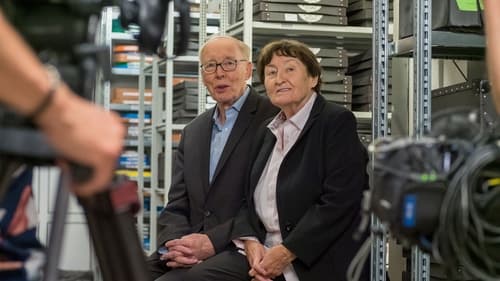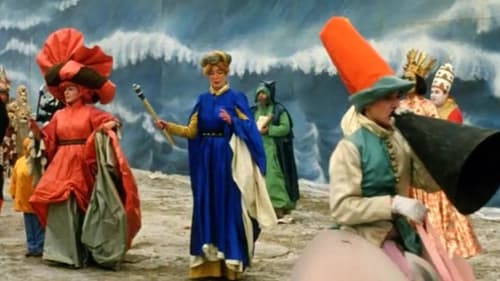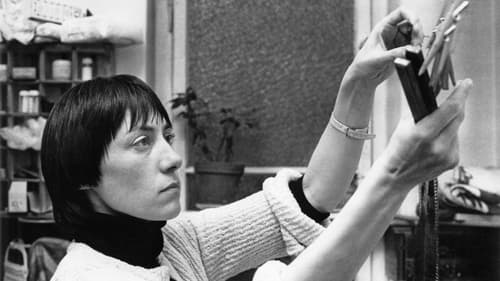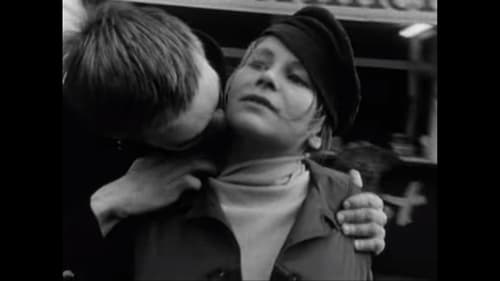
Helke Sander
영화 원제인 ‘Komm mit mir in das Cinema’(영화관으로 가자)는 사랑을 영화 속에서 찾을 수 있다고 썼던 엘제 라스커쉴러의 1937년도 시에서 가져온 것이다. 영화를 둘러싼 여러 담론과 관점에 있어서 전후 독일영화의 역사를 크게 확장시킨 에리카와 울리히 그레고어가 함께할 수 있었던 것은 바로 영화에 대한 사랑 덕분이었다.

(archive material)
은 1960년대 말 독일 적군파(RAF)를 탄생시킨 정치적 급진주의의 연대기를 다루고 있다. 독일의 혁명 테러리스트 그룹인 독일 적군파는 좌파 시사잡지인 ‘콩크레트’(Konkret)의 기자였던 울리케 마인호프와 그의 학생운동 후배인 안드레아스 바더를 중심으로 구드룬 엔슬린, 독일 필름&TV 아카데미의 학생인 홀거 마인츠와 변호사인 호르스트 말러에 의해 결성되었다. 영화는 68혁명의 시기부터 적군파가 비극을 맞이하게 되는 1977년 가을까지의 아카이브 푸티지로만 재구성 되었다. 특히 고다르, 파스빈더, 안토니오니를 포함한 당시 시네아스트들의 푸티지와 독일 필름&TV 아카데미 작품들은 이 비극적 연대기를 감동적인 울림으로 전한다. (2015년 7회 DMZ국제다큐영화제)

Producer
A documentary essay on the 1960s women's liberation movement in Germany and it's developments and conflicts through the following decades.

Writer
A documentary essay on the 1960s women's liberation movement in Germany and it's developments and conflicts through the following decades.

Director
A documentary essay on the 1960s women's liberation movement in Germany and it's developments and conflicts through the following decades.

Self
A documentary essay on the 1960s women's liberation movement in Germany and it's developments and conflicts through the following decades.

(voice)

Producer

Writer

Director

Self
A woman from a big city moves to a small village near the former border zone between East and West Germany. What is she looking for? What will she encounter? Rural life in the era of globalisation turns into an adventure. History lives in objects, stories and customs here since it was first recorded 800 years ago. Wars and famines have left their traces, just as churches, political parties and various forms of government. The change of the times, structured by television, has almost obscurely changed the old rhythms of life; supermarket offers changed eating habits and food stock economy. Is it folklore nostalgia or a matter of preserving one’s way and quality of life to keep the old customs and habits, such as preserving old types of plants and boiling down cucumbers? The village - a mutual exchange of experiences and garden products. The village is like an onion: it shows ever new surprising layers and leads us deep into unwritten pasts.

Editor
A woman from a big city moves to a small village near the former border zone between East and West Germany. What is she looking for? What will she encounter? Rural life in the era of globalisation turns into an adventure. History lives in objects, stories and customs here since it was first recorded 800 years ago. Wars and famines have left their traces, just as churches, political parties and various forms of government. The change of the times, structured by television, has almost obscurely changed the old rhythms of life; supermarket offers changed eating habits and food stock economy. Is it folklore nostalgia or a matter of preserving one’s way and quality of life to keep the old customs and habits, such as preserving old types of plants and boiling down cucumbers? The village - a mutual exchange of experiences and garden products. The village is like an onion: it shows ever new surprising layers and leads us deep into unwritten pasts.

Producer
A woman from a big city moves to a small village near the former border zone between East and West Germany. What is she looking for? What will she encounter? Rural life in the era of globalisation turns into an adventure. History lives in objects, stories and customs here since it was first recorded 800 years ago. Wars and famines have left their traces, just as churches, political parties and various forms of government. The change of the times, structured by television, has almost obscurely changed the old rhythms of life; supermarket offers changed eating habits and food stock economy. Is it folklore nostalgia or a matter of preserving one’s way and quality of life to keep the old customs and habits, such as preserving old types of plants and boiling down cucumbers? The village - a mutual exchange of experiences and garden products. The village is like an onion: it shows ever new surprising layers and leads us deep into unwritten pasts.

Writer
A woman from a big city moves to a small village near the former border zone between East and West Germany. What is she looking for? What will she encounter? Rural life in the era of globalisation turns into an adventure. History lives in objects, stories and customs here since it was first recorded 800 years ago. Wars and famines have left their traces, just as churches, political parties and various forms of government. The change of the times, structured by television, has almost obscurely changed the old rhythms of life; supermarket offers changed eating habits and food stock economy. Is it folklore nostalgia or a matter of preserving one’s way and quality of life to keep the old customs and habits, such as preserving old types of plants and boiling down cucumbers? The village - a mutual exchange of experiences and garden products. The village is like an onion: it shows ever new surprising layers and leads us deep into unwritten pasts.

Director
A woman from a big city moves to a small village near the former border zone between East and West Germany. What is she looking for? What will she encounter? Rural life in the era of globalisation turns into an adventure. History lives in objects, stories and customs here since it was first recorded 800 years ago. Wars and famines have left their traces, just as churches, political parties and various forms of government. The change of the times, structured by television, has almost obscurely changed the old rhythms of life; supermarket offers changed eating habits and food stock economy. Is it folklore nostalgia or a matter of preserving one’s way and quality of life to keep the old customs and habits, such as preserving old types of plants and boiling down cucumbers? The village - a mutual exchange of experiences and garden products. The village is like an onion: it shows ever new surprising layers and leads us deep into unwritten pasts.

Writer

Director

Editor

Producer

Lucy (voice)

Author

Director

Producer
Helke Sander interviews multiple German women who were raped in Berlin by Soviet soldiers in May 1945. Most women never spoke of their experience to anyone, due largely to the shame attached to rape in German culture at that time.

Editor
Helke Sander interviews multiple German women who were raped in Berlin by Soviet soldiers in May 1945. Most women never spoke of their experience to anyone, due largely to the shame attached to rape in German culture at that time.

Writer
Helke Sander interviews multiple German women who were raped in Berlin by Soviet soldiers in May 1945. Most women never spoke of their experience to anyone, due largely to the shame attached to rape in German culture at that time.

Self
Helke Sander interviews multiple German women who were raped in Berlin by Soviet soldiers in May 1945. Most women never spoke of their experience to anyone, due largely to the shame attached to rape in German culture at that time.

Director
Helke Sander interviews multiple German women who were raped in Berlin by Soviet soldiers in May 1945. Most women never spoke of their experience to anyone, due largely to the shame attached to rape in German culture at that time.

Self
A documentary with fictious elements. Ms. Elisabeth (Lieschen) Müller from Austria comes to Bonn, Germany to find herself a man. During the search she investigates the connections between neckties, political power and prostitution, and tries to look for the influence the german feminist movement had on the men in Germany's capital.

Editor
A documentary with fictious elements. Ms. Elisabeth (Lieschen) Müller from Austria comes to Bonn, Germany to find herself a man. During the search she investigates the connections between neckties, political power and prostitution, and tries to look for the influence the german feminist movement had on the men in Germany's capital.

Producer
A documentary with fictious elements. Ms. Elisabeth (Lieschen) Müller from Austria comes to Bonn, Germany to find herself a man. During the search she investigates the connections between neckties, political power and prostitution, and tries to look for the influence the german feminist movement had on the men in Germany's capital.

Writer
A documentary with fictious elements. Ms. Elisabeth (Lieschen) Müller from Austria comes to Bonn, Germany to find herself a man. During the search she investigates the connections between neckties, political power and prostitution, and tries to look for the influence the german feminist movement had on the men in Germany's capital.

Director
A documentary with fictious elements. Ms. Elisabeth (Lieschen) Müller from Austria comes to Bonn, Germany to find herself a man. During the search she investigates the connections between neckties, political power and prostitution, and tries to look for the influence the german feminist movement had on the men in Germany's capital.

Writer
Within four episodes ("Er am Ende", "Muss ich aufpassen", "Eva" and "Are You Lonesome Tonight?" ) are being told adventures of love sick Felix. On Sylt he meets two nymphomaniac women, in Hamburg he meets Eva, a girl who is even more love sick and later he meets Luci who gives him an indecent proposal. Thus he flees again...

Director
Within four episodes ("Er am Ende", "Muss ich aufpassen", "Eva" and "Are You Lonesome Tonight?" ) are being told adventures of love sick Felix. On Sylt he meets two nymphomaniac women, in Hamburg he meets Eva, a girl who is even more love sick and later he meets Luci who gives him an indecent proposal. Thus he flees again...

Producer
The 2nd of three self-contained shorts by Helke Sander from her series of shorts entitled From the Reports of Security Guards & Patrol Services.

Writer
The 2nd of three self-contained shorts by Helke Sander from her series of shorts entitled From the Reports of Security Guards & Patrol Services.

Director
The 2nd of three self-contained shorts by Helke Sander from her series of shorts entitled From the Reports of Security Guards & Patrol Services.

Producer
Here is the third and last of three self-contained shorts by Helke Sander from her series of shorts entitled From the Reports of Security Guards & Patrol Services . BTW the numbering of the parts is a bit confusing, the only existing parts of the series are No. 1,5 and 8.

Writer
Here is the third and last of three self-contained shorts by Helke Sander from her series of shorts entitled From the Reports of Security Guards & Patrol Services . BTW the numbering of the parts is a bit confusing, the only existing parts of the series are No. 1,5 and 8.

Director
Here is the third and last of three self-contained shorts by Helke Sander from her series of shorts entitled From the Reports of Security Guards & Patrol Services . BTW the numbering of the parts is a bit confusing, the only existing parts of the series are No. 1,5 and 8.

Writer
Seven Women, Seven Sins (1986) represents a quintessential moment in film history. The women filmmakers invited to direct for the seven sins were amongst the world's most renown: Helke Sander (Gluttony), Bette Gordon (Greed), Maxi Cohen (Anger), Chantal Akerman (Sloth), Valie Export (Lust), Laurence Gavron (Envy), and Ulrike Ottinger (Pride). Each filmmaker had the liberty of choosing a sin to interpret as they wished. The final film reflected this diversity, including traditional narrative fiction, experimental video, a musical, a radical documentary, and was delivered in multiple formats from 16, super 16, video and 35mm.

Director
Seven Women, Seven Sins (1986) represents a quintessential moment in film history. The women filmmakers invited to direct for the seven sins were amongst the world's most renown: Helke Sander (Gluttony), Bette Gordon (Greed), Maxi Cohen (Anger), Chantal Akerman (Sloth), Valie Export (Lust), Laurence Gavron (Envy), and Ulrike Ottinger (Pride). Each filmmaker had the liberty of choosing a sin to interpret as they wished. The final film reflected this diversity, including traditional narrative fiction, experimental video, a musical, a radical documentary, and was delivered in multiple formats from 16, super 16, video and 35mm.

Producer
A woman threatens to jump off a crane with her two young children in order to secure affordable housing. Won Golden Bear for Best Short at the 1985 International Film Festival Berlin.

Writer
A woman threatens to jump off a crane with her two young children in order to secure affordable housing. Won Golden Bear for Best Short at the 1985 International Film Festival Berlin.

Director
A woman threatens to jump off a crane with her two young children in order to secure affordable housing. Won Golden Bear for Best Short at the 1985 International Film Festival Berlin.

Producer
Story concerns two friends, Freya and Irmtraut and their relationships with the same man, Traugott, who finds it impossible to choose between the two women.

Freya Lombardi
Story concerns two friends, Freya and Irmtraut and their relationships with the same man, Traugott, who finds it impossible to choose between the two women.

Writer
Story concerns two friends, Freya and Irmtraut and their relationships with the same man, Traugott, who finds it impossible to choose between the two women.

Director
Story concerns two friends, Freya and Irmtraut and their relationships with the same man, Traugott, who finds it impossible to choose between the two women.

Berlin Underground-star Ulrike S. went to the Toronto-Filmfestival and then to New York - to find out something about the film business and also about her own desires, daydreams and nightmares.

Narrator (voice)
At the end of the 1960s a young woman lays the foundation of the women's movement. As well as political initiatives against male dominance, a detailed picture is drawn of society, which establishes the women’s motivation.

Producer
At the end of the 1960s a young woman lays the foundation of the women's movement. As well as political initiatives against male dominance, a detailed picture is drawn of society, which establishes the women’s motivation.

Writer
At the end of the 1960s a young woman lays the foundation of the women's movement. As well as political initiatives against male dominance, a detailed picture is drawn of society, which establishes the women’s motivation.

Director
At the end of the 1960s a young woman lays the foundation of the women's movement. As well as political initiatives against male dominance, a detailed picture is drawn of society, which establishes the women’s motivation.

Edda Chiemnyjewski
서독의 프리랜서 언론 사진가인 34살의 에다는 본인의 수입으로 딸을 돌보는 데 턱도 없다. 그녀가 속한 여성사진가 그룹은 베를린 시로부터 기금을 받아 베를린의 이미지를 담은 전시 프로젝트를 추진하려고 하지만, 비용과 성차별 등 많은 제약이 존재한다.

Writer
서독의 프리랜서 언론 사진가인 34살의 에다는 본인의 수입으로 딸을 돌보는 데 턱도 없다. 그녀가 속한 여성사진가 그룹은 베를린 시로부터 기금을 받아 베를린의 이미지를 담은 전시 프로젝트를 추진하려고 하지만, 비용과 성차별 등 많은 제약이 존재한다.

Director
서독의 프리랜서 언론 사진가인 34살의 에다는 본인의 수입으로 딸을 돌보는 데 턱도 없다. 그녀가 속한 여성사진가 그룹은 베를린 시로부터 기금을 받아 베를린의 이미지를 담은 전시 프로젝트를 추진하려고 하지만, 비용과 성차별 등 많은 제약이 존재한다.

Anna, an artist, is obsessed with the invasion of alien doubles bent on total destruction. Her schizophrenia is reflected in the juxtapositions of long movie camera takes with violently edited montages: private with public spaces; black & white with colour, still photographs with video, earsplitting sounds with disruptive camera angles. Anna uses her body like a map; after a devastating quarrel with her lover, she paints red stitches on herself. Watching their scenes together, we realize how seldom, if ever before, the details of sexual intimacy have been shown in film from the point of view from a woman. Export privileges rupture over unity and never settles for one-dimensional solutions

Writer

Director

Writer
In a critique to the Berliner films that depicted labour problems always through masculine lens, Sander changes the point of view. Irene, single mother, works in a washing machine factory and has to deal with discrimination, sexual harassment and lack of solidarity.

Director
In a critique to the Berliner films that depicted labour problems always through masculine lens, Sander changes the point of view. Irene, single mother, works in a washing machine factory and has to deal with discrimination, sexual harassment and lack of solidarity.

Cinematography

Writer

Director

Film by a student collective of the dffb.

Assistant Director
An austere treatise on the military-industrial complex that produces napalm.

Ihre Zeitungen is a political film rooted in the 1968 student campaign against the Springer press group, which controlled popular dailies such as the Berliner Zeitung and the Bild Zeitung. Claiming the latter were manipulating public opinion, the students laid siege to the publisher's offices. These events made a strong impression on the German collective conscience, and it's in this context that Farocki made this "agit-prop" film.

Writer
Documentary by Helke Sander, in collaboration with Harun Farocki (among others), about the campaign of the West German New Left against the publishing house Springer, particularly its control and manipulation of the news.

Director
Documentary by Helke Sander, in collaboration with Harun Farocki (among others), about the campaign of the West German New Left against the publishing house Springer, particularly its control and manipulation of the news.

“Six young people move through a city in order to establish the starting point of their joint action. But they can’t agree on the topic. In the end everybody goes their own way and leaves the city.” - Hartmut Bitomsky

Self

Writer

Director

Assistant Director
I was on a ship – this sounds like a novel: I had just embarked for Venezuela on June 2, 1967 as the Shah of Iran was arriving in West Berlin. There were protests, a student was shot, and a new form of opposition movement came into existence. The idea for this film came to me while I was still aboard the ship. The film is structured like a commercial. The film takes a metaphor literally: words can become weapons. However, it also shows that these weapons are made of paper. The weapon spoiled everything for the Shah and his wife, they are wearing paper bags on their heads with faces drawn on them – the kind of bags worn by Iranian students during demonstrations to hide their identity from the Savak, the Iranian Secret Service. When I showed this film to the audiences in the late 60s, it was highly praised. I think people understood then that over obviousness is also a form of irony. This capacity was lost a few years later. I think it's coming back today. –HF

Editor
A concise blast of feminist film making, Sander's first film is a tense yet playful four minute short that dissects a typical urban scene at a bus stop on a busy street in Berlin.

Screenplay
A concise blast of feminist film making, Sander's first film is a tense yet playful four minute short that dissects a typical urban scene at a bus stop on a busy street in Berlin.

Director
A concise blast of feminist film making, Sander's first film is a tense yet playful four minute short that dissects a typical urban scene at a bus stop on a busy street in Berlin.

Woman
Analysis of an incident in Nazi Germany involving a man and a jewish woman.























































